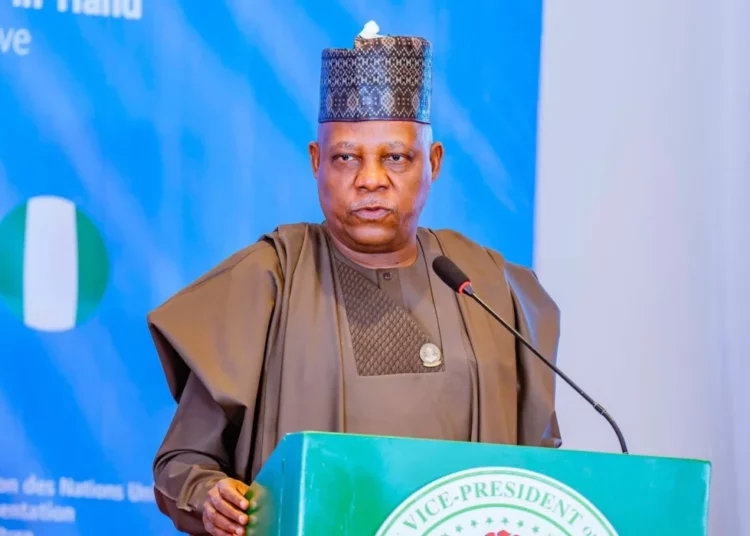The Petroleum and Natural Gas Senior Staff Association of Nigeria (PENGASSAN) has fired back at the Presidency after Vice President Kashim Shettima condemned the union’s recent industrial action over the sacking of workers by the Dangote Petroleum Refinery.
- Recall that Shettima, while speaking at the 2025 Nigerian Economic Summit in Abuja on Monday, described Africa’s richest man, Aliko Dangote, as “not just an individual, but an institution and a pillar of Nigeria’s economic development.”
The Vice President warned that “Nigeria is greater than PENGASSAN,” urging labour unions to act with patriotism and avoid holding the nation to ransom over industrial disputes.
“Aliko Dangote is not an individual; he’s an institution, a leading light in Nigeria’s economic parliament,” Shettima said.
“If he had invested $10bn in Microsoft or Amazon, he might be worth $70bn by now. But he chose to invest in his country, and we owe it to future generations to protect his interest. It’s not about holding the whole nation to ransom because of a minor labour dispute. Nigeria is greater than PENGASSAN. Nigeria is greater than each and every one of us.”
But, in a swift response, PENGASSAN National President Festus Osifo said Shettima’s remarks were misplaced, insisting that the association’s loyalty lies with its members, not with any individual or corporation.
“Of course, the nation is bigger than PENGASSAN, the same way it’s bigger than Dangote and the Presidency,” Osifo said
“We have a mandate to protect the jobs of our members, and we will discharge that duty whenever the need arises. Should this same event occur again tomorrow, our approach will be exactly the same.”
Osifo, who also doubles as President of the Trade Union Congress (TUC), dismissed suggestions that the government could dissolve PENGASSAN over the strike, saying, “Does the law prohibit workers’ right to strike?”
Similarly, PENGASSAN’s General Secretary, Lumumba Okugbawa, said, “Is Nigeria not bigger than any individual or institution?”
LEADERSHIP reports that the confrontation stemmed from last week’s nationwide strike by oil and gas workers following allegations that the Dangote Refinery sacked 800 employees for joining the union. The refinery, however, denied the figure, claiming only a few workers were let go for alleged sabotage and as part of internal reorganisation.
The industrial action disrupted oil and gas production and caused power generation drops, leading to nationwide fuel queues and a spike in cooking gas prices, which now hover around ₦2,000 per kg from ₦900 before the crisis.
The strike was called off after the Federal Government intervened and directed the Dangote Group to redeploy the affected workers to other business units.
Meanwhile, protests erupted in Kaduna on Monday as demonstrators accused PENGASSAN of trying to sabotage the Dangote Refinery.
The protesters, under the banner Partners for National Economic Progress (PANEP), marched through major streets carrying placards that read “Protect Local Refining,” “End Fuel Import Cartel,” and “Support Dangote Refinery.”
Addressing the crowd, PANEP leader Igwe Ude-Umanta accused a powerful oil importation cartel and “elements within the labour movement” of plotting to frustrate local refining efforts.
“This struggle is against the cartel that destroyed our public refineries, killed the textile industry, and now wants to strangle the Dangote Refinery. We will not let them succeed,” Ude-Umanta declared.
Another protest leader, Dahiru Maishanu, went further, describing PENGASSAN’s actions as “economic terrorism.”
“What PENGASSAN did was not unionism; it was sabotage,” Maishanu said. “The Federal Government should have arrested their leadership to serve as a deterrent. We cannot allow people to hide under labour unions to commit crimes against our economy.”
The protesters urged President Bola Tinubu to ensure local refineries are supplied crude at the same rate as foreign refineries, insisting that “if we kill the Dangote Refinery, no investor will ever bring money into this country again.”
Reacting to the protests, Osifo dismissed the demonstrators as “ignorant people,” while Okugbawa maintained that “it’s their constitutional right to protest.”
Amid the unfolding crisis, PENGASSAN’s national leadership reportedly dissolved its Nigerian Gas Infrastructure Company (NGIC) and Nigerian Gas Marketing Limited (NGML) branch for failing to cut gas supply to the Dangote Refinery during the strike.
However, members of the dissolved chapter have petitioned the national secretariat, describing the move as “unjust and demoralising.”
In a letter signed by 163 members, the branch said it faced “operational hazards, intimidation, and heavy security presence” that made it impossible to fully implement the shutdown order.
“Our leaders did more than enough to carry out the directive despite their lives being at risk. Allegations of collusion and bribery are false and baseless,” the petition stated.
The members also revealed that technical and safety issues, including faulty emergency shutdown valves at the Warri Gas Treatment Plant, prevented a total shutdown.
“At no point did the branch claim the refinery had been completely shut down,” the petition clarified. “They only closed some valves along the line to reduce pressure, but the move didn’t yield the expected result.”
The branch urged the PENGASSAN national leadership to review its decision, warning that punishing loyal members would “weaken solidarity in future union struggles.”
In a statement, Dangote Petroleum Refinery thanked President Bola Tinubu for his “timely intervention” in averting what it called the “disruptive actions of PENGASSAN.”
“We remain grateful to the President for his leadership, and to ministers and security chiefs who worked tirelessly into the wee hours of several nights to avert disruption to Nigeria’s energy sector by anarchists and agents of darkness,” the company said.
The refinery specifically commended the National Security Adviser, Nuhu Ribadu; the DSS Director General, Adeola Ajayi; the NIA Director General, Mohammed Mohammed; and several cabinet ministers, including Wale Edun, Abubakar Bagudu, Mohammed Dingyadi, and Nkeiruka Onyejeocha.
“Their patriotism and national service helped restore order and stability to the energy sector at a critical moment,” the company added.
Speaking at the same summit, Minister of Budget and Economic Planning Abubakar Bagudu said government reforms had stabilised the economy, citing improved GDP growth to 3.4 per cent in 2024 and a projected 4.6 per cent in 2025.
“The next focus is sustaining the reform for achieving growth and development. Inflationary expectations are on the decline, and we shall continue to support domestic production,” Bagudu said.
Minister of Industry, Trade and Investment, Dr Jumoke Oduwole, stressed the need for translating trade policy into tangible impact.
“Talk is cheap. It’s time to move from words to results,” she said, disclosing that Nigeria had submitted its tariff schedules under the African Continental Free Trade Area (AfCFTA) and negotiated new trade opportunities with Uganda and Ecuador.
NESG Chairman, Olaniyi Yusuf, meanwhile, warned that investor confidence depends on how Nigeria treats its domestic investors.
“Dead businesses don’t employ workers, they don’t pay salaries, and they don’t pay taxes. Regulators must enable, not stifle, private sector growth,” Yusuf said.
“Nigeria must send a clear signal: we will protect, not picket, investors.”





